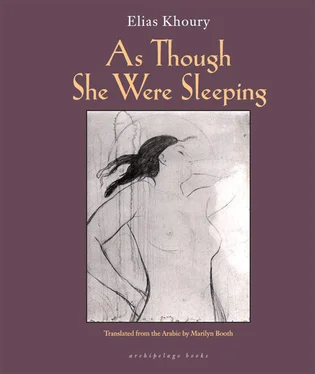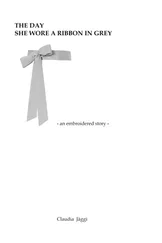Close your eyes and breathe deeply. It’s chloroform to take away the pain, said the voice, coming from a direction she could not distinguish.
The whiteness vanished. Little Milia ran through the streets of the night. The voice piercing her nighttime no longer came steadily, and then it broke off and the only echo was a faint moan from the woman’s throat. As the sound faded she heard the doctor ordering the two nurses to step back.
Let her get some rest.
Where did the sounds of bells come from? It’s labneh in bread, Uncle. Take your hand away from me and let me eat.
Milia knows that her uncle Mitri’s story is one that must not be told. The only boy in the family, a brother to two sisters, Mitri died strangulated by the church bell and no one dared take down the corpse, swinging on the long bell rope, until Nakhleh came from the house at a run. He saw his son’s body dangling from the bell rope and screamed that they had killed him. He asked the young men of the quarter to help him untie the rope from the boy’s neck, which had stretched long and thin like a length of rubber.
Mitri came down from the enormous photograph hanging on the whitewashed wall in the home of Nakhleh Shalhoub. Milia saw him come down as though the picture, encased in a gilded wood frame, had suddenly become a window. This uncle in his red tarbush, the white silk abaya that curved over his rotund belly, and a bamboo cane still gripped in his hand, crossed the wooden frame and came into the dar . He walked straight over to Milia and hugged her as the aroma of labneh and onions rose. The little girl sensed that this man was taking her far away.
Mitri picks up the small girl and walks back to the picture frame. He sticks his right foot forward and takes a leap as if to cross a stream.
Pay attention, now, dear, watch out you don’t fall in the river and drown.
But there’s no water, Uncle.
The roar of the water rises to invade her petite ears. Why is the river green? she asks him.
The river is not green. Your eyes are green and so you see everything through a green tint.
Please, take me out, she cries.
She calls out to her brother Musa, but he is standing on the other riverbank, waving both hands at her.
I don’t want to go with him.
The girl begins to kick the man but it is no use. Mitri grabs her around the waist and lifts her to perch against his large stomach and walks across the water without sinking.
See how I can walk on the face of the water! If the sons of Zurayq knew who I am, they wouldn’t have done to me what they did.
What did they do?
They killed me. Five young men gathered round me in the church courtyard. I heard the bell ringing. They were holding kitchen knives and they attacked me. All I could hear was the bell clanging. It began to ring in my insides, in my eyes and my hands and feet. I realized then what death means. Death is voices and sounds, and it is all a matter of luck and fate. My fate was the church bell.
But how did they kill you?
The bell killed me. To avoid them I held on to the rope and I flew up, and then I was circling and the rope began twisting around my neck as I flew. They stood there below looking like mad dervishes, slicing their knives through the air to scare me — what could scare me about them when I was flying with the bell and the cord was wrapping itself around my neck?
Well, then why did you die?
I died because I died. I still hear the bell ringing, I hear it always, pounding and pounding inside of me, and that’s why I tug my tarbush down over my ears. My mother always said to me, Push it up — it should sit higher on your head! What did she know? She had no idea what I was hearing, always hearing, and anyway she wasn’t my mother. I called her my mother because that’s what she wanted. When my papa married her and she came to the house I said, Welcome, Khala Malakeh. She said, I’m not your aunt and that word khala makes the foundations of the house tremble. Call me mother. But how could I do that? Mother?! She was my age, or nearly so. Well, not exactly, maybe ten years older but she looked like a young girl. She married and had children and instead of getting older she got younger. She had my sister Saadeh and then five years later my sister Salma came along. Her belly would grow but she was so small and thin, and pretty too, that she never really looked pregnant. I was fifteen when my father married her. I told him his wife was pretty and, I said, she was awfully young. How can you do it, Papa? I mean. . with her? He glared at me and said, Get out. He chased me out of the house — well, no, he didn’t kick me out permanently but he made me understand that I was not to come anywhere near. So I got on with my life. I built a tree house in the big eucalyptus tree in the garden and I began to sleep there every night. On rainy nights my mother Malakeh would come out of the house to stand beneath the tree telling me to come down and into the house. So I did what she said but as soon as my father saw me he would give me that same look, with his eyes like slits, and I felt strange. Uncomfortable. All my life I lived a stranger in my father’s house, and if Malakeh hadn’t felt sorry for me and fed me, I would have died of hunger. What a sweet woman she was! I was always angry and upset at the time. My mother had been dead only two months when I started hearing people speaking under their breath. The man should get married, they said, to protect him from evil. Ya haraam ya Nasmeh! Her name was Nasmeh, and like her name said, she was as fresh and delicate as a breeze through the trees. She died and I never knew why. She woke up one day and couldn’t open her eyes. I heard her saying to my father, over and over, she couldn’t. . she couldn’t. . and she could not see anything and her fever kept rising. She was like that for two days and then she died. She asked for me — everyone said to me, Your mama wants you, and I went to her and I sat on the bed beside her. She took my hand and she held on tight. It felt like holding a block of ice, but I didn’t move, and then I heard the women wailing and they said she was dead. I tried to take my hand away but I couldn’t. Her hand was like hard wood. I heard the women saying, Look at this boy, how he loves his mama, he’s refusing to let go of her hand. A bit later my father came in and said, Yallah, habibi , get up. He grabbed me by the shoulders and dragged me and I began to scream, and my mama was dragged along too.
Let go of her hand! my father yelled.
I couldn’t talk, it was the crying. The worst thing is when you are crying in the back of your throat. The tears go down there and they sit and then you can’t speak because the words can’t get by them.
My father grabbed my hand and yanked hard and my mother slipped toward me and the women’s moaning got louder. Suddenly, and I don’t know where it came from, I heard my voice. Ayy, my hand! He was trying to open her fingers. He began sobbing like a little boy and saying, Wife, forgive me. And then Malakeh came and then she was my mother.
And your hand, how did they get your hand away from hers?
The bell is always ringing in my ears, tell them, Milia, my dear, tell them to stop the sound so I can rest.
All right. So, put me down.
I can’t. If I do, you’ll die.
I want to die, Milia screamed.
Mansour stood at her bedside. Hearing her, he hurried over to the nurses, who were having a chat in the corridor while they waited for the Italian doctor.
Please, Milia is dying!
The first nurse gave her twin a look and smiled before turning to Mansour and telling him not to worry. They all say that, she said. And then everything goes along just fine.
Mansour could see the heavy sweat beading up on his wife’s neck. He took her hand and asked her to open her eyes. She turned toward the source of the voice. Her eyelids parted ever so slightly and she moved her hand indicating that Mansour should go. Her lips moved just enough to whisper one word. Thirsty . Mansour hurried out to the nurses and told them his wife was thirsty and he wanted to give her some water.
Читать дальше












